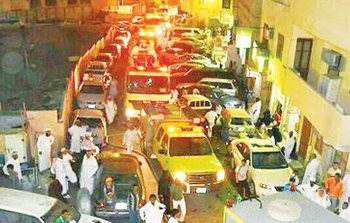 Jeddah, Jul 17: Civil Defense officers have evacuated all 256 guests from a hotel in Misfala district of Makkah in the early hours of Wednesday after a fire broke out in one of its rooms, sabq.org reported.
Jeddah, Jul 17: Civil Defense officers have evacuated all 256 guests from a hotel in Misfala district of Makkah in the early hours of Wednesday after a fire broke out in one of its rooms, sabq.org reported.
Three firefighting teams took part in putting out the blaze and rescuing the hotel guests. The fire started from a room in the first floor of the nine-story building.
Civil Defense officers were able to contain the fire in a record time before it could spread to other floors of the building. However, billowing smoke affected people staying in upper floors of the hotel.
“We have carried out the evacuation process safely without causing any harm to hotel guests,” said Brig. Saleh Al-Olyani, spokesman of the department in Makkah. He said nobody was killed or injured in the accident.
The department has launched an investigation to find out the reason behind the fire.
In a related development, nine people were injured in a fire that broke out in a Dammam market (Haraj) on Tuesday.
Fahd Al-Ghamdi, spokesman of Saudi Red Crescent Authority in the Eastern Province, said the fire broke out at the market Tuesday afternoon.
He said his volunteers have provided first-aid services to nine injured workers. “We have taken four of them to Dammam Central Hospital for further treatment,” the spokesman said.
Bloggers have criticized the Civil Defense Department for its delay in responding to the Dammam fire, although it occurred very close to its office. One of them suggested that the market be shifted to another place, away from residential areas.





Comments
Add new comment